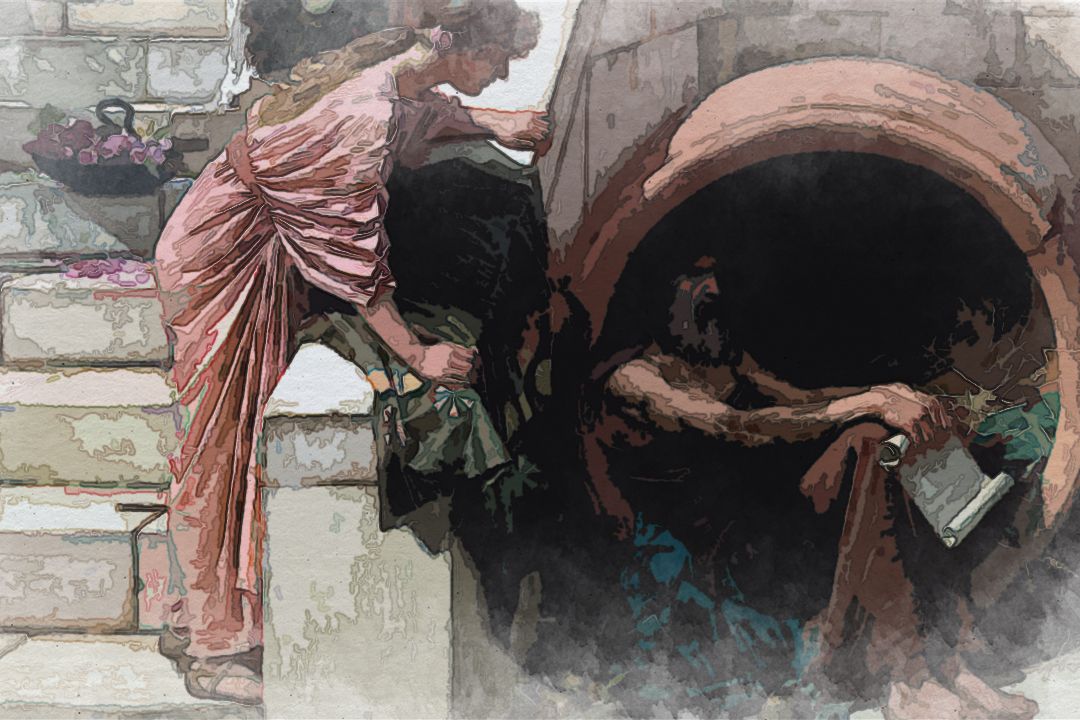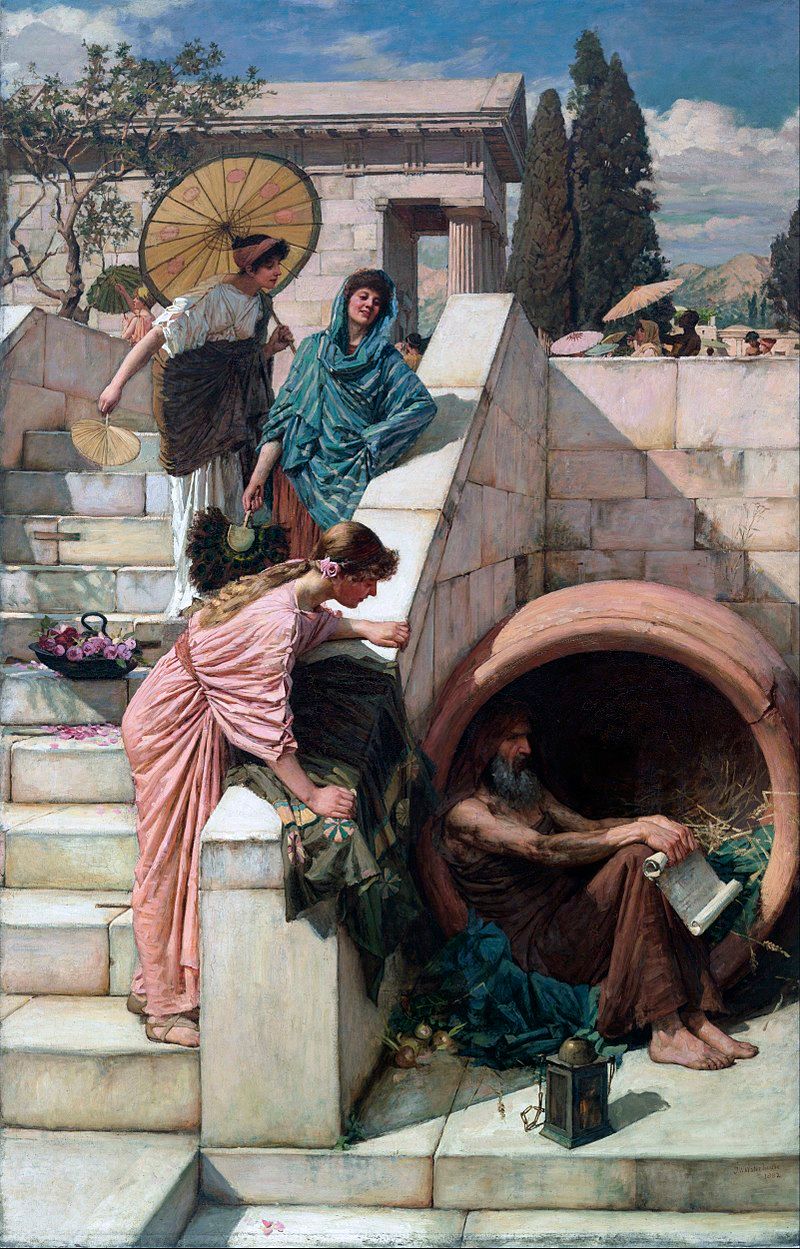La Vita Semplice

Diogenes and the Philosophy of the Simple Life
Diogenes, the Cynic philosopher, tirelessly roamed in the lively streets of Athens, his lantern held high even in daylight, casting intriguing shadows on curious onlookers. Diogenes embodied the philosophy of the simple life with his scruffy beard and worn-out cloak.
In his quest, he encountered individuals claiming virtue but failing to live up to their words. The city buzzed with whispers about Diogenes, the man challenging the status quo with his relentless pursuit. As he traversed the streets, the memory of Plato's description of knowledge seeped into the narrative, reminding the narrator of the fleeting nature of understanding.
Never express yourself more clearly than you are able to think.
— Niels Bohr (1885-1962)
... mumbled Diogenes, contemplating the irony of his search. Was he seeking an ideal existing only in his thoughts? The paradox lingered as he continued his quest.
The city's elite sought him out, intrigued by the enigmatic philosopher. Women of influence and wealth, curious, approached Diogenes, lantern in hand, as he spoke of the simplicity of life and the pursuit of genuine virtue. He left the women both puzzled and intrigued.
As Diogenes, the wandering philosopher, mumbled to himself, his words floated into the crisp Athenian air, carrying the weight of contemplation. The ambient sounds of the bustling city were momentarily drowned by the echoes of his inner musings, as he grappled with the profound irony inherent in his relentless search for an honest man. Was he, in fact, pursuing an ideal that existed solely within the recesses of his thoughts, a mirage of virtue perpetually just out of reach? The paradox lingered in his mind, a shadow accompanying him through the narrow streets.
The city's elite, drawn to the enigma of Diogenes, actively sought him out, intrigued by the man who dared to challenge the established norms. These men and women of influence, accustomed to the opulence and grandeur of their privileged lives, found themselves captivated by the simplicity embodied in the scruffy philosopher. With lantern in hand, Diogenes stood before them, a beacon of authenticity in a world often mired in pretense.
As he spoke of the beauty found in leading a life unencumbered by the trappings of material excess, and the pursuit of genuine virtue, the women of influence and wealth listened with a mixture of puzzlement and intrigue. Diogenes' words were not just a philosophical discourse; they were a reminder of the simplicity that often eluded those who lived within the lavish lifestyles of privilege.
In the glow of his lantern, Diogenes painted a vivid picture of a life guided by authenticity and virtue rather than societal expectations. His words sparked curiosity, and the women, accustomed to a world defined by opulence and excess, found themselves navigating the uncharted territory of simplicity and genuine virtue.
The paradox of a philosopher advocating for simplicity while surrounded by the elite added layers to the enigma of Diogenes. His presence challenged the very foundations of their societal norms, leaving the women both puzzled and intrigued. In a world that often measured worth by material wealth, Diogenes stood as a living contradiction, a testament to the power of authenticity and the pursuit of a virtuous life.
As the lantern's glow flickered in the night, casting dancing shadows on the faces of the elite, Diogenes' philosophy lingered in the air. The women, now left to ponder the implications of his words, found themselves at the crossroads of curiosity and introspection. The simplicity he spoke of was not a rejection of wealth but a call to rediscover the core values that often got overshadowed in the pursuit of opulence.
The enigmatic philosopher, with his scruffy appearance and uncompromising ideals, had become a catalyst for reflection among the elite. The lantern, once a mere source of light, had transformed into a symbol of enlightenment, illuminating the path toward a more authentic and virtuous existence. In this intersection of worlds, the paradox of a philosopher challenging societal norms while being embraced by the elite created a narrative rich in complexity and contemplation.
As Diogenes continued his journey through the streets, the echoes of his interactions with the city's elite resonated. The paradox, now deeply embedded in the collective consciousness of those who had crossed paths with him, served as a silent reminder that authenticity and virtue were not exclusive to any social stratum. The philosopher's lantern, flickering against the backdrop of privilege, continued to illuminate the path toward a life guided by simplicity and genuine virtue, leaving the city's elite both puzzled and intrigued by the paradoxical wisdom of Diogenes.
We must be free not because we claim freedom, but because we practice it.
— William Faulkner (1897-1962)
... Diogenes asserted, challenging societal norms. His words resonated with some, while others dismissed him as a madman. As he stood amidst the curious crowd, his words carried a revolutionary weight, transcending the conventional understanding of freedom.
For those who listened intently, Diogenes' message struck a chord that resonated with the yearning for genuine liberation. To them, it wasn't merely about professing the desire for freedom but actively embodying it in everyday actions. It was a call to live authentically, unburdened by societal expectations and the shackles of conformity.
However, not everyone embraced Diogenes' philosophy with open minds. To some, his unconventional lifestyle, his rejection of material comforts, and his fearless questioning of established norms painted him as a madman. They dismissed his words as the ramblings of an eccentric mind, failing to grasp the profound depth within his seemingly unconventional wisdom.
In Diogenes's time, which was during the 4th century BCE in ancient Greece, the concept of translation would have been quite different from our modern understanding. Ancient Greeks, including figures like Diogenes, lived in a world where language and cultural exchange were significant, but the formal practice of translation, as we understand it today, did not exist in the same structured manner.
Translation is the art of failure.
— Umberto Eco (1932-2016)
During this period, the primary language of intellectual discourse and written works was Ancient Greek. The Greeks were keenly aware of linguistic diversity, given the numerous city-states, colonies, and interactions with neighboring cultures. However, the approach to dealing with different languages and cultures was often through the adoption or adaptation of ideas rather than through formal translation.
In terms of language diversity, the Greeks encountered various dialects within their own territories, and interactions with non-Greek speakers led to linguistic exchanges. The process of linguistic adaptation was more organic, occurring through cultural assimilation, trade, and colonization.
Diogenes, known for his Cynic philosophy and unorthodox lifestyle, would likely have interacted with people from different regions and linguistic backgrounds. In these interactions, the exchange of ideas and perspectives would have taken place, and the need for conveying thoughts across linguistic boundaries might have arisen.
However, it's crucial to note that the formal practice of translation, as a deliberate and systematic effort to render texts from one language into another, was not as developed or standardized in ancient Greece as it is today. The famous works of Greek literature, philosophy, and drama were primarily written in Greek, and the dissemination of these works to other cultures often involved a process of adaptation rather than direct translation.
The challenges and nuances associated with translating ideas between languages were more implicit in the broader context of cultural and intellectual exchange rather than being a specialized and formalized field.

The planksip Writers' Cooperative is proud to sponsor an exciting article rewriting competition where you can win over $750,000 in prize money.
Figures of Speech Collection Personified
Our editorial instructions for your contest submission are simple: incorporate the quotes and imagery from the above article into your submission.
What emerges is entirely up to you!
Winners receive $500 per winning entry multiplied by the article's featured quotes. Our largest prize is $8,000 for rewriting the following article;

At planksip, we believe in changing the way people engage; at least, that's the Idea (ἰδέα). By becoming a member of our thought-provoking community, you'll have the chance to win incredible prizes and access our extensive network of media outlets that will amplify your voice as a thought leader. Your membership truly matters!


